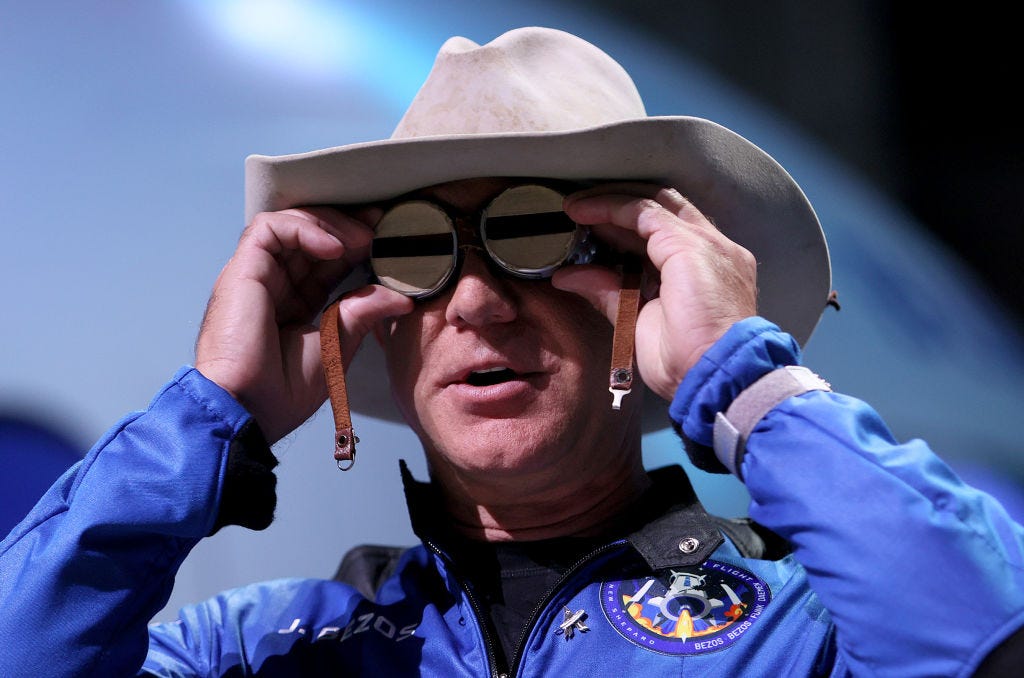
On Monday, Popular Information published its report on the Washington Post's abrupt decision not to endorse in the 2024 presidential election. At the time, owner Jeff Bezos had not spoken publicly, and Washington Post publisher Will Lewis sought to discredit reports that Bezos had made the call. “Reporting around the role of The Washington Post owner and the decision not to publish a presidential endorsement has been inaccurate,” Lewis said. “He was not sent, did not read and did not opine on any draft. As Publisher, I do not believe in presidential endorsements."
On Monday evening, Bezos published a column in the Washington Post and (surprise!) admitted that it was his decision. "I will also not allow this paper to stay on autopilot and fade into irrelevance," Bezos wrote, as part of an extended defense of the new policy. Bezos acknowledged the truth after Lewis' initial defense failed to satisfy the Washington Post's readership. The paper reportedly lost 200,000 paid subscribers over the weekend.
But Bezos' defense is not any more convincing. He claims that the timing of the decision — two weeks before an election — was simply a coincidence and not "intentional." He offers no alternative explanation of the timing other than to say it was the result of "inadequate planning." The fact that the CEO of Blue Origin, Bezos' space exploration company, met with Trump on the day Bezos decided the Washington Post would not endorse, according to Bezos, was also a coincidence and not a "quid pro quo."
Bezos acknowledges he has "a web of conflicting interests" and "[e]very day, somewhere, some Amazon executive or Blue Origin executive or someone from the other philanthropies and companies I own or invest in is meeting with government officials." But he simply waives those conflicts away. "I assure you that my views here are, in fact, principled," Bezos asserts. "I challenge you to find one instance in those 11 years where I have prevailed upon anyone at The Post in favor of my own interests."
Bezos advanced his interests over those of the Washington Post when he intervened in the editorial process and spiked an endorsement of Harris days before the election. The decision, predictably, has damaged the credibility of the Washington Post among its readership, but ingratiated Bezos with the Trump campaign and, potentially, a future Trump administration.
This is a choice that Bezos made. He could have decided not to interfere with the Washington Post's editorial product. He could even choose to adopt a formal policy precluding his intervention to safeguard the Washington Post's integrity. Instead, he chose to personally intervene in the Washington Post's editorial process despite his massive conflicts of interest. Bezos also chose to install Lewis, an executive with deep ties to Rupert Murdoch, to run the Washington Post as its CEO.
Bezos claims that people who care about journalism have no choice but to accept his decisions and excuses — and trust his benevolent leadership. The only alternative, according to Bezos, is to rely on "off-the-cuff podcasts, inaccurate social media posts and other unverified news sources."
Bezos is wrong. The Washington Post employs many talented journalists who produce some of the best reporting in the country. (Several have resigned in protest of Bezos' decision.)
But it is possible to do meaningful journalism without being under the thumb of a conflicted billionaire. Independent outlets like ProPublica, 404 Media, the Marshall Project, the Texas Tribune, Mother Jones, the American Prospect, the Bulwark and, yes, Popular Information do it every day.



Mr. Bezos thinks very highly of himself. As a former Amazon employee, we had to watch videos of him telling us about The Amazon Way and how if you follow his advice, you too can make the big bucks. His personal vanity doesn’t allow for him to believe he’s wrong.
The Philadelphia Inquirer has maintained a critical voice in these chaotic times.